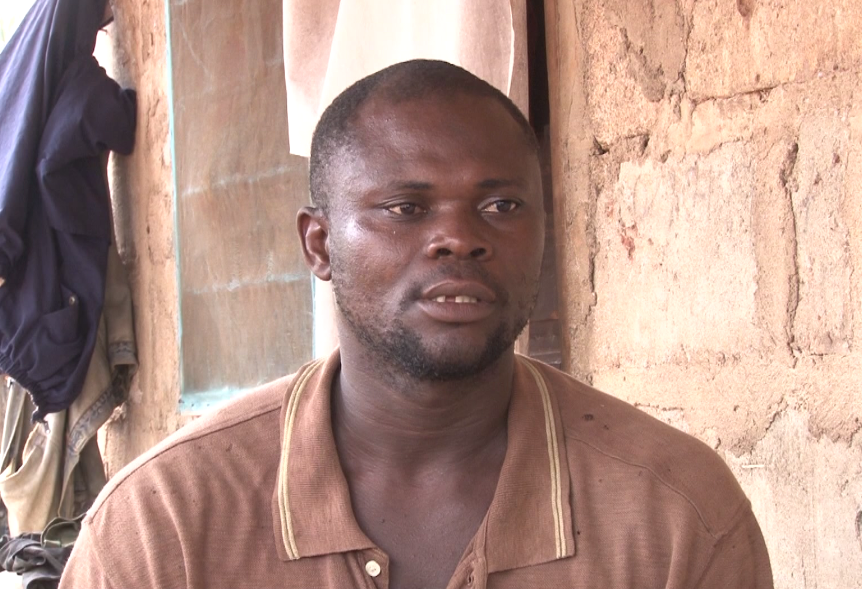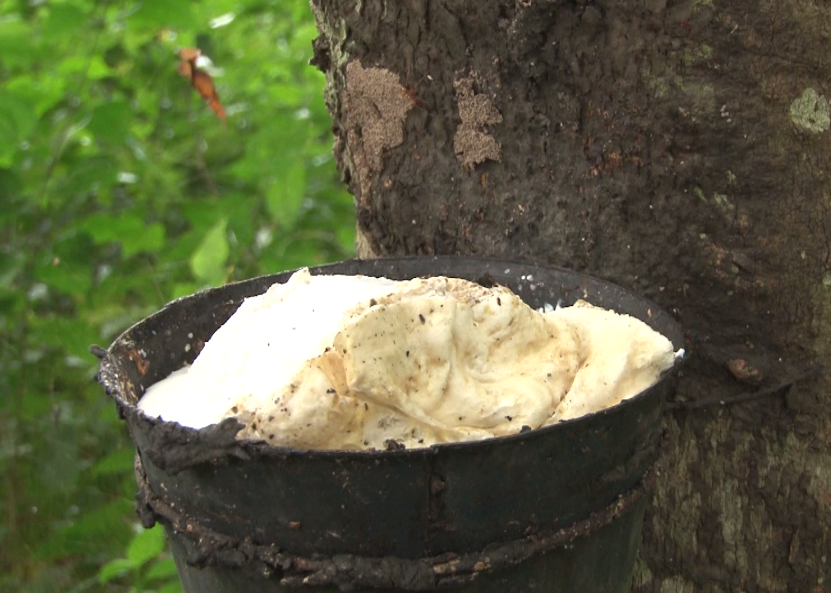As Ghana’s cocoa fields and other farms are cleared to make way for rubber plantations, many communities are slipping back into food insecurity.
This trend is threatening the nation’s progress in fighting extreme hunger and poverty. Currently, Ghana is a largely food-secure country, having successfully achieved its Millennium Development Goal by reducing the hunger prevalence rate from 40.5 percent of the population in 1990 to less than five percent in 2013, according to data from the United Nations.
But players in the agricultural sector are warning that a lot of Ghana’s cocoa communities are gradually returning to a food insecure status, and urgent steps are needed to halt the trend. Asikasu, a small farming village of about 10,000 people in the nation’s Eastern Region, is one such community.
“When you look at the destroyed lands, it’s more than 49,00 acres (2,000 hectares) of farms that have been destroyed” to make way for rubber plantations, farmer James Mensah explained. “Half of that was cocoa. Plantain, coconut, orange, maize and other crops on the land were also destroyed.”

Because cocoa trees yield pods seasonally, farmers typically would plant food crops between their fields, relying on the harvests to feed their families until the cocoa was harvested. But it’s difficult to plant food crops in between rubber trees because they suck virtually all the nutrients in the soil, and also emit a pungent rubber smell, villagers said.
As a result, the community is struggling to feed itself, said Barima Kwabena Tanoh, a traditional leader in the village. “Now there is hunger at Asikasu. The destruction of the cocoa trees also led to the destruction of food crops. The youth have all left and so there is no one to farm,” he said.
Mensah puts the problem of food insecurity in better perspective by explaining how shortages have driven up prices. “At first, when you buy 2 cedis (fifty US cents) worth of cassava, you and your family of five will be satisfied. But now, you will spend more than 10 cedis (US$4.50) before you will be ok,” he said.
There are other stories of such destruction to make way for rubber plantations all around the Upper West Akyem, Suhum and Ayensua North Districts in the Eastern Region. The cocoa farmers accuse Ghana Rubber Estates Limited (GREL), a company in which the government of Ghana holds 25 percent of the shares, of taking over their lands forcibly and destroying the cocoa — a claim the company insists is untrue.
Seidu Mahama, the 2015 Suhum Municipal best farmer, said the situation has caused an economic downturn in the region. “We have been using money from cocoa and plantain to educate our children. Now that they have been destroyed, where can we get food?” he questioned.

But GREL has defended its business model, insisting it is not on a deliberate campaign to destroy cocoa farms. The company said it has acquired thousands of hectares of land, some of which included working cocoa farms, from the paramount chief in the affected areas. In a statement, GREL said it is working to pay adequate compensation packages to affected farmers. “For the Asikasu land, about 95 percent of the tenant farmers have received their compensation, but the remaining 5 percent are refusing to accept the compensation, claiming personal ownership of the land,” the statement explained.
The farmers dispute the company’s claim, insisting that more than 50 percent of the farmers have rejected the compensation. Mensah said a lot of those who accepted the compensation were forced to settle. “They didn’t have a choice because their farms were gone and they didn’t know if they will get it back,” he said.
Apart from managing thousands of acres of rubber plantations, GREL also has an out-grower program that has been supporting farmers for several decades now to plant rubber trees on their own lands and subsequently sell the product to the company for export to Asia. John Cobbinah, chairman of the Western Rubber Farmers Association, said that a lot of farmers in the Western Region destroyed their cocoa and other crops to plant rubber 20 years ago, but have not seen the benefit of the decision. The feeling of regret is all too real here.
“In 1995, GREL came to tell us government has asked them to bring us rubber trees. They said one acre of rubber was more profitable than 10 acres of cocoa. They told us everyone needs to grow rubber to wipe out poverty. So they made us cut down our cocoa, coconut, oranges and cassava,” Cobbinah explained.
This led to food insecurity challenges that the communities have not yet recovered from. “So we stopped growing those foods to grow rubber. We didn’t have food to eat. But we endured because we were looking forward to a good future. That never came,” he added.
Cobbinah said the region struggled as food prices hiked following the establishment of rubber plantations. Homes broke down as couples separated because of hardship. “No food can be grown in the rubber plantations and this caused us a lot of problems at Agona Swedru. Food prices went up. Unfortunately, the expected good profit from rubber plantations didn’t come either,” he said.
COCOBOD, which regulates Ghana’s cocoa industry, said it is working to ensure Ghana regains its spot as the top cocoa grower in the world, with an annual target of 1 million tonnes well in sight. But that will obviously not be possible unless the cocoa farm displacement issues are fixed once and for all. Noah Amenya, COCOBOD public relations officer, said his agency remains committed to protecting the country’s cocoa fields.
“Where we know that this is happening, we talk to the chiefs, opinion leaders and even the farmers themselves…..we tell them don’t give farms out to be cut for such plantations because cocoa has helped this country for a very long time and if you cut it down, we are depriving the country of the necessary revenues, which cannot be compared to what rubber, for instance, is doing for the country,” he said.
Nana Oboadie, chairman of the Concerned Farmers Association, wants government to do more to stop further destruction of farms, as it could have dire consequences on the country’s food security. “We don’t eat rubber in this country. There is nowhere in this world that they will accept rubber and abandon cocoa and other farms…. Rubber is a wild plant. They can send it to the forest. But the fertile land is what people eat from, what we can get plantain from, and they can’t destroy it…..” he said.
